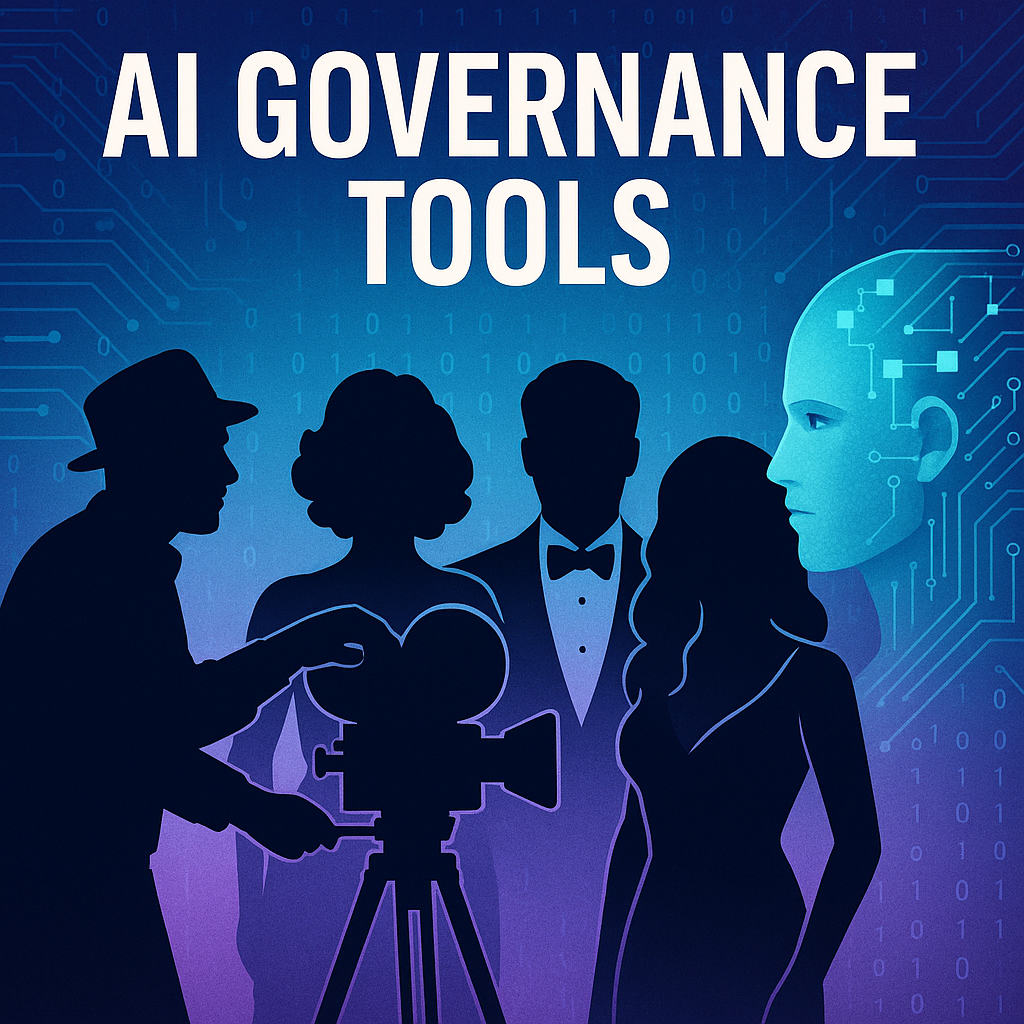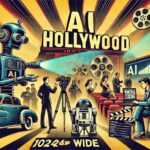In the glittering world of movies and celebrities, the focus is increasingly on AI governance tools rather than on who wore what on the red carpet or who is seeing whom. Hollywood is being compelled to ask difficult ethical questions as artificial intelligence quickly changes the entertainment sector from deepfake actors to predictive scriptwriting. Tech is under control by who? It is applied in what manner? More importantly, though, how can we make sure it doesn’t spiral into chaos?
In this article, we explore how AI governance tools are becoming essential in the realm of movies and celebrity culture. We’ll unpack how these tools function, why they matter, and the impact they’re already having on everything from casting decisions to fan engagement. Yes, even your favorite celebrity might be protected—or replaced—by an AI decision-making system.
What Are AI Governance Tools?
Let us start with the foundations before delving into the Hollywood anarchy. Tools for artificial intelligence governance are systems, frameworks, or protocols meant to monitor the evolution and application of AI technologies. Consider them as traffic signals on the accelerating road of invention. Absence of them results in anarchy.
In the entertainment industry, these tools are tailored to address specific issues like:
- Intellectual property rights for AI-generated content
- Identity theft via deepfakes
- Biases in casting algorithms
- Transparency in AI-based decision-making systems
In an age where AI can create a lifelike version of Marilyn Monroe or digitally rejuvenate Harrison Ford, governance is no longer optional—it’s mandatory.

Hollywood’s AI Dilemma: Deepfakes and Beyond
Let’s rewind to 2019, when a deepfake of Tom Cruise went viral on TikTok. It looked so real that millions were fooled into thinking the actor had joined the app. That’s when the alarm bells started ringing across Hollywood. If a simple app could clone Tom Cruise, what could a multi-billion dollar studio do?
That’s where AI governance tools stepped in. Studios began exploring how to legally and ethically deploy AI in filmmaking. These tools now assess whether the usage of deepfake tech respects the actor’s likeness rights, public image, and even emotional impact on viewers.
Celebrities vs. AI: The Right to Identity
Imagine waking up one day to see your face fronting a film you did not star in. Sounds quite like a Black Mirror episode. That is, the reality some celebrities live.
Consider Scarlett Johansson, for example. She publicly denounced an artificial intelligence chatbot in 2023 for copying her voice without permission. AI governance instruments help to avoid such situations. These tools:
- Log consent digitally
- Authenticate AI-generated likenesses
- Alert stakeholders to unauthorized usage
By using governance frameworks, celebrities regain control over their identity—a valuable currency in today’s media landscape.
Studios Take Charge: Implementing AI Governance Tools
Top studios like Warner Bros. and Universal are no longer just film factories—they’re becoming tech powerhouses. With the rise of AI, studios are investing heavily in governance infrastructures.
For example, Warner Bros. has adopted a compliance system that scans scripts generated by AI for racial or gender bias. This ensures not only ethical storytelling but also legal safety.
Universal Pictures has taken it a step further by using AI governance tools to monitor AI usage in post-production, ensuring CGI modifications respect actors’ contracts and public images.
Behind the Scenes: Tools Used in Scriptwriting and Post-Production
AI isn’t just a front-stage performer—it’s also changing what happens behind the camera. From writing compelling plotlines to editing scenes based on audience emotions, AI is everywhere. But without proper governance, creativity could quickly become a legal minefield.
Tools like OpenAI’s API and Adobe Sensei are governed internally by protocols that check for:
- Inappropriate or biased content
- Unattributed script lifts
- Algorithmic overreach (where AI makes artistic decisions without human oversight)
AI governance tools are helping writers, directors, and producers maintain creative control while still leveraging technology.
Influencer Culture and AI Regulation
The Kardashians aren’t the only influencers ruling Instagram. Virtual influencers—like Lil Miquela—have millions of followers without actually existing. They’re powered by AI, yet their influence is real.
This opens up a Pandora’s box of ethical issues:
- Who’s responsible when a virtual influencer promotes a product?
- How do we regulate interactions with underage followers?
- What if the AI model goes rogue or spreads misinformation?
AI governance tools answer these questions by implementing real-time monitoring, policy enforcement, and compliance auditing—all tailored for the influencer economy.
Case Study: The Rise of Digital Avatars and Virtual Influencers
In 2024, a digital avatar of James Dean starred in a new indie sci-fi flick. While some applauded the technological marvel, others called it a desecration of legacy. The debate centered around ethics and control.
Enter AI governance tools.
The production company used tools to:
- Obtain permission from Dean’s estate
- Log usage rights for every frame
- Disclose AI-generated scenes in credits
This transparency was praised by both critics and audiences, showing how governance tools can balance innovation with respect.
AI Governance Tools in Fan Interaction and Social Media
AI isn’t just changing how celebrities perform—it’s also altering how they interact with fans. Many A-listers now use AI chatbots to engage on social media. While this scales interaction, it also raises concerns about:
- Misrepresentation
- Manipulation
- Breach of trust
Governance tools are now built into these bots, ensuring:
- Clear disclaimers
- Ethical interaction limits
- Data protection for users
When Selena Gomez fans discovered her AI-managed bot, the clear labeling and responsible interaction actually increased trust, proving governance pays off.
The Legal Framework and Industry Standards
Entertainment lawyers are now as familiar with algorithms as they are with contracts. The law is evolving, but so are AI governance standards. Organizations like the MPAA and SAG-AFTRA are pushing for legally enforceable AI protocols.
Their focus includes:
- Licensing AI-generated performances
- Ensuring residuals for AI-used appearances
- Safeguarding artistic intent
AI governance tools are essential to enforce these frameworks and ensure compliance from tech providers and studios alike.
Ethics in Entertainment: A Moral Compass for AI
It’s not just about legality—it’s also about ethics. How do we treat resurrected digital versions of deceased actors? How do we respect the creative process in a tech-dominated space?
AI governance tools are now including ethical checklists, much like how films are rated for content. These tools:
- Evaluate societal impact
- Assess emotional manipulation
- Score projects on diversity and inclusion
When ethics and entertainment merge, the industry moves toward a more responsible and inclusive future.
Conclusion: Why AI Governance Tools Are the Real Stars of the Future
From Oscar-winning performances to viral Instagram reels, artificial intelligence is reshaping every corner of the entertainment world. But without structure, guidance, and accountability, that transformation risks becoming exploitation.
AI governance tools are more than just background frameworks—they are the unsung heroes keeping creativity safe, ethical, and sustainable. As we dive deeper into a future where actors might be digital and scripts written by algorithms, these tools will become as critical as the cameras and lights that built Hollywood in the first place.
In the end, whether you’re a die-hard movie buff or just an occasional TMZ reader, understanding how AI governance tools are reshaping the celebrity landscape isn’t just fascinating—it’s essential. Because in the age of AI, even fame needs a rulebook. Also read How AI Agency changing Hollywood.





